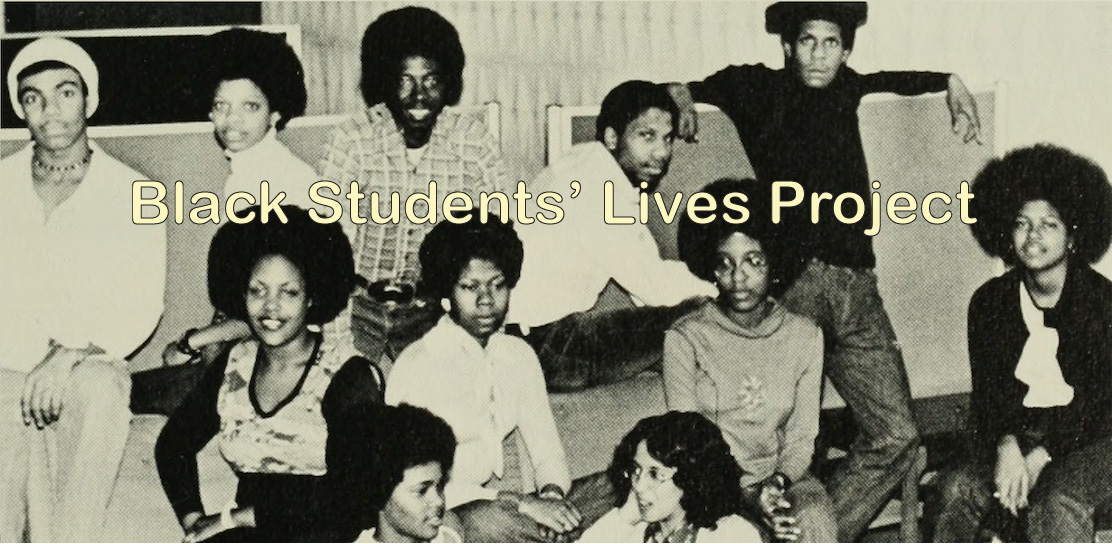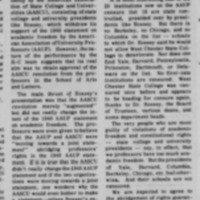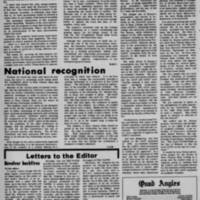Comment
Title
Comment
Subject
censorship, AAUP, Martin Watkins
Description
This Comment article details the history of censure at West Chester and Watkins' argument about the freedom of free speech for university professors. He describes how West Chester believes that professors do not have the right to free speech but major university in the country do. As a result, West Chester was censored by the AAUP for this ideal in the 40s and they are likely to be censored again.
Creator
Martin Watkins
Source
Quad Angles
Publisher
Special Collections, Francis Harvey Green Library, West Chester University
Date
1970-12-15
Contributor
Maria Marabito
Rights
Digital images in Library Services' Digital Collections are issued by Special Collections, Francis Harvey Green Library, West Chester University. Images are provided for non-commercial, educational, and personal use only, and are not intended for reproduction or redistribution. For the above purposes the user may reproduce these materials (by download, printing, etc.) without further permission, on the condition that proper attribution of the source for all copies is provided by clearly acknowledging the name of the Library, the title of the web page or resource and the URL at which it was located, please credit as follows: Special Collections, Francis Harvey Green Library, West Chester University, West Chester, Pennsylvania. For questions regarding use of digital materials contact Special Collections (libspeccol@wcupa.edu or 610-436-3456).
Identifier
https://digital.klnpa.org/digital/collection/wcnp01/id/14072/rec/34
Text
Comment By MARTIN A. WATKINS I hope that you will be able to print the following. The team of Rossey and Clokey performed in a remarkably synchronized manner on Wednesday, December 9, before a tongue-tied yet unappreciative audience of members of the WCSC School of Arts and Letters. The choreography and a few carefully chosen words were by Clokey, and the deceptive, semantic dance was by Rossey. At the conclusion, not one pair of hands applauded our great president's eight-minute performance, and the star of the R-C team left hurriedly. The alleged aim of Rossey,s presentation was merely to explain the resolution passed recently by the American Association of State College and Universities (AASCU), consisting of state college and university presidents like Rossey, which withdrew its support of the 1940 statement on academic freedom by the American Association of University Professors (AAUP). However, the nature of the performance by the R-C team suggests that its real aim was to obtain approval of the AASCU resolution from the professors in the School of Arts and Letters. The main thrust of Rossey,s presentation was that the AASCU resolution merely "augmented" but did not really change the intent of the 1940 AAUP statement on academic freedom. The professors were even given to believe that the AAUP and AASCU were "moving towards a joint statement" abridging professors' rights in the 1940 AAUP statement. If it is true that the AASCU didn't really change the 1940 AAUP statement and if the two organizations were moving towards a joint statement, one wonders why the AASCU would even bother to make a statement--unless Rossey's explanations were manufactured from whole cloth in an attempt to hoodwink the faculty at West Chester.Furthermore, no one except Clokey and Rossey had copies of the AASCU statement, and only a handful of professors had seen the resolution. Yet intelligent professors were expected to approve the AASCU resolution. Just how dangerous, just how radical is the AAUP statement of 1940 on academic freedom that the AASCU, which previously supported the statement, resolved to withdraw its approval? In a word, the AAUP statement of 1940 says that the rights guaranteed to all Americans by our Constitution should not be denied, but should be enjoyed even by college professors--and it places upon college professors certain responsibilities which other Americans do not bear. It is the Magna Carta of our profession. The AAUP statement is not a revolutionary doctrine, not by the farthest stretch of the imagination, except to those who feel that democracy itself is a danger -- and revolutionary. College professors do not need to suffer more repression, to have their inherent rights further abridged, but rather those abridged rights must be restored, strengthened, and extended if colleges are to become democratic institutions in a society that claims to be democratic. Indeed, colleges and universities, which profess to uphold and to teach democracy, are the most fitting places for democracy to be practiced. It is most interesting that of the 25 institutions now on the AAUP censure list 18 are state controlled, presided over by presidents like Rossey. But there is no Berkeley, no Chicago, and no Columbia on the list -- schools to which Dr. Rossey said he would not allow West Chester State College to deteriorate. Nor does one find Yale, Harvard, Pennsylvania, Princeton, Dartmouth, or Delaware on the list. No first-rate institutions are censured. West Chester State College was censured once before and appears to be heading for censure again, thanks to Dr. Rossey, the Board of Trustees, various deans, and some department heads. The very people who are most guilty of violations of academic freedom and constitutional rights -- state college and university presidents -- say, in effect, that we professors have too much academic freedom. But the presidents of Yale, Harvard, Columbia, Berkeley, Chicago, etc. feel otherwise. And their schools are not censured. We are expected to agree to the abridgement of rights guaranteed by our Constitution. Who in his right mind would agree to such a request? Who would agree in advance to officiate at his own funeral? The AASCU and Dr. Rossey propose restrictions and abridgements to our rights in the name of academic freedom. I am reminded of Emerson's statement about Daniel Webster, who supported his defense of slavery on the grounds of patriotism. Said Emerson, "The word PATRIOTISM on the lips of Webster is like the word LOVE on the lips of a courtesan."It would be most fitting and entirely proper for the faculty of West Chester State College as a group and the student body as a separate group to condemn both the AASCU and President Rossey for the resolution withdrawing support of the 1940 AAUP statement on academic freedom.
Files
Reference
Martin Watkins 1970, Comment, Special Collections, Francis Harvey Green Library, West Chester University



